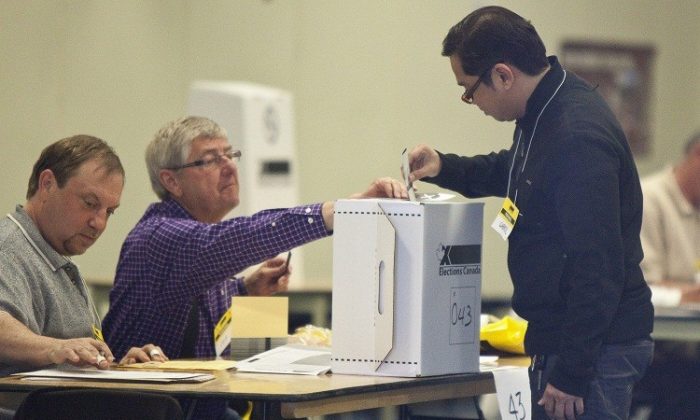
A voter casts his ballot in Canada’s federal election at a polling station in Calgary, Alberta, on May 2, 2011. (Geoff Robins/AFP/Getty Images)
By
Commentary
The revelation by Mike Burgess, the head of the Australian Security Intelligence Organisation (ASIO), that foreign espionage has increased significantly in Australia was unsurprising.
Burgess said two years ago that Asia’s counter-espionage activities had surpassed its anti-terrorism efforts in recent times.
He previously warned of a plot by a foreign government to have candidates sympathetic to it elected to parliament.
What surprised many was his blunt statement this year that he had been pressured to curtail the organisation’s investigations.
“Individuals in business, academia and the bureaucracy have told me ASIO should ease up its operational responses to avoid upsetting foreign regimes,” Burgess said.
“Of course, they are entitled to their views, but the reasons they offer for them are flimsy, such as: ‘all countries spy on each other’; ‘we were going to make the information public anyway’; ‘it’s no different to lobbying or networking’; ‘the foreign government might make things difficult for us’; and so on.
“In my opinion, anyone saying these things should reflect on their commitment to Australia’s democracy, sovereignty, and values—because espionage and foreign interference is deliberately calculated to undermine Australia’s democracy, sovereignty, and values.”
Although the spy chief did not say it, it is well known in security and defence circles that the chief culprit is China.
Pressure from supporters of the Chinese Communist Party (CCP), business people with investments in or trade with China, and even agents of the regime is well-known to many people in the foreign policy and trade areas.
“We need China for trade,” “you are risking our investments,” “we can’t change the CCP, we have to live with them,” are just some of the statements made to me over the past few decades.
Others urged no mention of the CCP’s appalling human rights record.
Political Interference Campaigns
The ASIO’s chief’s revelations come at a time when Canadian Security Intelligence Service (CSIS) reports indicate a campaign by the CCP to disrupt the nation’s 2021 elections and defeat conservative politicians critical of Beijing.
The documents show that the campaign aimed to elect a minority Liberal government and defeat certain conservative candidates.
According to a report in Canada’s Globe and Mail newspaper, which had obtained the documents, the CCP was “pressuring its consulates to create strategies to leverage politically [active] Chinese community members and associations within Canadian society.”
These organisations were being used to advocate on behalf of the Beijing regime “while obfuscating links to the People’s Republic of China (PRC).”
Disinformation campaigns to discredit the conservatives were central to the push.
As occurred in Australia during last year’s national election, criticism of the CCP was used to assert conservative candidates and parties would threaten the lifestyle and future of Chinese immigrants.
The CSIS documents reveal how agents of the Chinese regime, including members of the Chinese-language media, were instructed to stress that the Canadian Conservative Party was too critical of China and would take a hard line against Chinese students, banning them from universities.
“This will threaten the future of the voters’ children, as it will limit their education opportunities,” a Chinese consulate official was quoted as claiming in the CSIS documents.
The documents set out detailed plans to interfere in the Canadian elections, including the use of political donations.
Concerningly, the authors asserted that “it’s easy to influence Chinese immigrants to agree with the PRC’s stance.”
The reports named the former Chinese consul to Toronto as saying that the defeat of a Conservative member of parliament proved that “their strategy and tactics were good.”
The revelations follow allegations of significant foreign interference by China in the 2019 Canadian elections to support 11 candidates, mostly representing the Canadian Liberals, in the Toronto metropolitan region.
The revelations come after an internal Liberal Party review of the 2022 Australian election found that the party’s opponents pushed a perception among voters of Chinese heritage that criticisms of the CCP were criticisms of ordinary Chinese people.
As the review noted, in the top 15 seats by Chinese heritage, the swing against the party (on a two-party preferred basis) was 6.6 percent, compared to 3.7 percent in other seats.
While most Chinese immigrants to Australia came here to escape the authoritarian government and give their families a better future, the influence of the regime’s United Work Department and other agents of influence cannot be ignored.
Many more recent arrivals are part of a new “orbit” generation—people who move between Australia and China, living in both countries.
They are subject to the unrelenting propaganda of the CCP, which insists that members of the diaspora retain loyalty to China.
Many have family living in China and remain concerned for their safety.
As the ASIO and CSIS reports show, these are very significant issues for our security and democracy.
Views expressed in this article are the opinions of the author and do not necessarily reflect the views of NTD Canada.